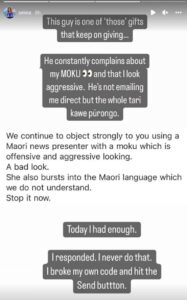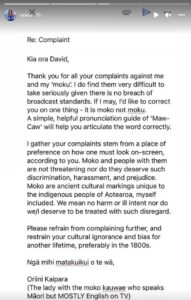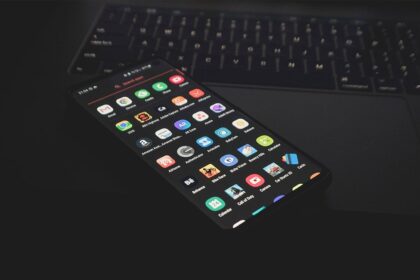
Maori the TV host, who proudly wears a traditional Maori facial tattoo, elegantly responded to criticism from a viewer, confidently expressing her pride in her cultural background and individual identity.
Online discussions often arise concerning facial tattoos, with certain individuals advocating for confining them to the body, whereas others acknowledge their cultural importance.
Oriini Kaipara, a pioneering presenter, achieved a historic milestone at the age of 41 by becoming the first primetime news anchor to proudly display a moko kauae, a sacred cultural emblem traditionally worn by Maori women.
The Maori community, the indigenous Polynesian residents of mainland New Zealand, consider moko kauae as powerful symbols of their culture and uniqueness. Historically etched on the lips and chins, these facial designs symbolize a woman's familial ties, her influential position within society, and recognize her ancestry, standing, and skills.

Nevertheless, among the compliments, a single viewer, known as David, conveyed discontent regarding Kaipara's moko kauae in a message sent to Newshub.
The hiring of a Maori newsreader with a moko that is deemed offensive and aggressive is strongly objected to. This individual also switches to the Maori language, which is not understood. It is requested to stop this practice without delay.
Kaipara fearlessly confronted the issue directly, despite David's negative comments, by posting screenshots of the messages on her Instagram story and replying with grace and composure.
In an Instagram story, she expressed, “Today I have reached my threshold and decided to respond. This is not something I usually do. I have gone against my own principle and sent the message,” she stated, attaching a screenshot of David's message.
Kaipara also forwarded her email reply to David, stating that she was unable to consider his complaint seriously “since there is no breach of broadcast standards.”
She also rectified his spelling of moko, since David had mistakenly called hers “moku.”
In her email, Kaipara further stated: “I comprehend that your concerns stem from your individual preferences regarding visual presentation on screen. Moko and the individuals who adorn them should not be seen as threatening, and they certainly do not warrant any form of bias, mistreatment, or unfair treatment.”
She emphasized that there is no malice or ill intent, and that she does not merit such disrespectful treatment. She requested that complaints cease and that cultural ignorance and bias be put aside, as if it were a thing of the past, specifically the 1800s.

Kaipara highlighted that, although David provided a critical review, the majority of feedback she receives is positive, with only occasional encounters with negative comments.
During an interview with the New Zealand Herald following his response to David's complaint, Kaipara emphasized the significance of increasing the number of Maori advocates: “The fact that my mere existence is unsettling to certain individuals highlights the necessity for more Maori advocates to hold influential positions in various sectors.”

Kaipara's articulate reply acts as a powerful reinforcement of the importance of cultural pride and strength in times of hardship, motivating individuals to confidently embrace their heritage and confront prejudiced beliefs.













